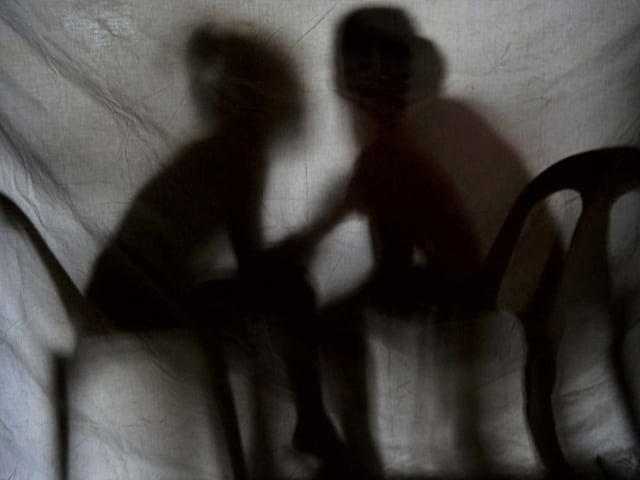
Mommy and Daddy can hug you and pick you up,but if a stranger tries to do that, it should not be acceptable. PHOTO: AFP
When your “trusted” male servant is caught molesting your little girl, what can you do as a parent?
The servant was touching the young girl everywhere, and lifted his kameez and pushed the girl's face between his legs.
Some miseries are avoidable. If you speak to victims of sexual abuse and sexual harassment, they’ll tell you they wished they had spoken up. Done something to stop it. Wished somehow they could have had the opportunity to stop it from happening. They live with this guilt, among other negative feelings for years.
This is why educating masses ,especially parents is essential. More than children and individuals alone, educational systems and parents should be given lessons on how to deal with such situations and what can be done to prevent such instances from happening.
One such way is fairly simple – teach your children about good touch and bad touch. Teach them about personal distance and individual space. Moreover, parents should be vigilant and alert when it comes to children. If the child is alone with someone, drop in unexpectedly to check up on them.
Recently, an account was shared on Facebook where a female child was being molested by her male servant in the car. The servant was apparently touching the young girl everywhere, and at one point lifted his kameez and pushed the girl's face between his legs and covered it. When the individual who came across this incident, spoke to the child’s family, he was turned away. Understandably, because someone knocking on your door and informing you that your child has been sexually assaulted may be disturbing and hence too much to take in. Nevertheless, it is extremely important to take notice of such episodes and not turn a blind eye.
 Photo: Screenshot
Photo: ScreenshotChildren don’t know when they are being taken advantage of, and this is why sexual abuse is an important matter to educate children on. It’s a pity this subject isn’t taught at schools, and it’s even more pitiful that parents would rather shove this awareness issue under the carpet instead of addressing it and realising that the best way to protect our children is to educate them and to help them be cognizant of predators.
In the aforementioned incident, it was a noble deed for the Samaritan to inform the parents, but they chose to draw a veil over it. People usually don't want to get involved in such occurrences or contact authorities for that matter. Most of them are afraid of what people might say and don’t want to be part of the stigma that exists. However, it is absolutely crucial to understand here that this is an epidemic and if people just live in denial about the existence of this menace, it is not going to go away. The only solution is awareness.
Here are a few things we can do to deal with this:
Talk to your children
Children need to be taught about boundaries, for example who can hug them and who cannot. Teach them about appropriate and inappropriate touch and create an atmosphere where your child can comfortably confide in you regarding such issues. Mommy and Daddy can hug you and pick you up,but if a stranger tries to do that, it should not be acceptable. Most kids have this inbuilt ability to sense danger and unfamiliar surroundings but it is always better to teach children to reinforce this instinct even more.
Listen to your children
This is as important as talking to your children. When your child tells you he or she feels uncomfortable with someone, immediately pay attention. If they run away from particular people for some reason, pay attention. Perhaps they are unable to verbalise it but their instincts are never wrong. In some cases, nightmares, anxiety attacks and withdrawal symptoms in children are also signs of abuse.
Art therapy and psychologists involvement
Thanks to the crazily omnipresent stigma about mental illness in our society, people think that the only people who go to therapists are insane people. This is completely untrue and unhelpful as well as dangerous. It is always good to have therapists and therapeutic measures for children as well as adults. Most good schools have in-house therapists and “safe spaces” where children can say and express whatever they want without being judged and feared. This needs to happen more and more in Pakistan.
Get schools involved
Schools should educate children about sexual abuse as much as parents. There should be classes and teachers should be well-versed in the terms and rules of this issue to educate children appropriately. The school itself should also have strict personal distance laws.
Moreover, most good schools have systems in place where children’s designated guardian is the only one who can pick them and drop them – but in Pakistani parenting terms, the picking and dropping culture is mostly left on maids and drivers. This needs to be regulated. House help – if trusted with this big responsibility of picking and dropping our children – should be thoroughly vetted before being entrusted with this. It is always better to have school-designated vans and pick and drop services to avoid this sort of behaviour. It doesn't necessarily mean that child abuse might never happen in a school van – it’s just that there’s a slightly lesser chance of that happening compared to the former situation where a child is alone with the servant in the car for that long.
Law enforcement
I heard about a recent precedent where house help were required to file their details at a nearby police station and a written affidavit that such and such person is employed at such and such house. This is an important step, because in case the help is found behaving in an untoward manner towards the children, they know that they can be reported and even arrested.
Nanny cams aren’t a bad idea
Thanks to technology, it’s not impossible to keep a literal check on your children. Some time ago, I came across a video on Facebook where a nanny was seen on CCTV camera physically abusing an infant. No matter where you are, you can keep an eye on the home via IP cameras that can be installed in your home and you can see the audio/video from wherever you are on your phone.
Set rules for people you know – and you don’t know
We live in a very tactile society – almost everyone’s a hugger. And that is great. But it’s only okay for adults. With little kids, it’s okay to ask people to be a little careful. Don’t care if you sound rude. Do it. Tell your children only to shake hands and smile politely, instead of being hugged or kissed too much by strangers or certain family relatives.




COMMENTS (13)
Comments are moderated and generally will be posted if they are on-topic and not abusive.
For more information, please see our Comments FAQ